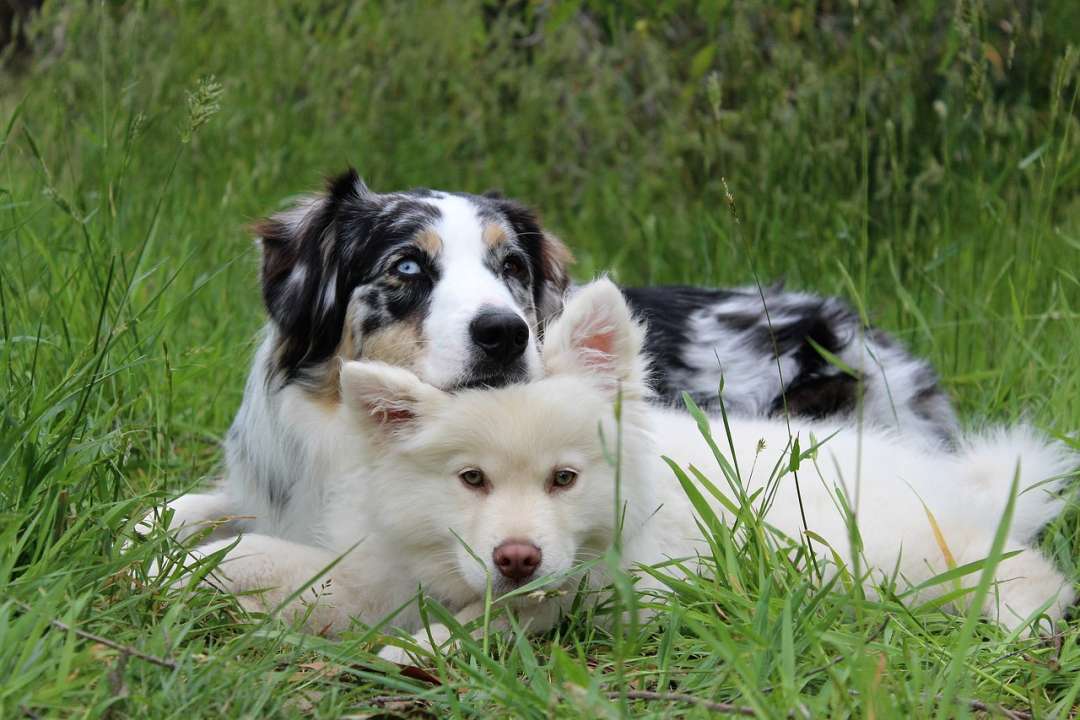
Why Dogs Bark
Dogs will be dogs, and most dogs will bark, whine and howl at times. It's only natural.
Excessive barking can become a problem, especially when there are neighbors living nearby who may find the barking annoying. Barking is one type of vocal communication that dogs use, and it can mean different things depending on the situation.
A barking dog could be trying to establish territory, warning a potential threat not to come closer, or just letting other dogs know where they are.
Getting your dog to bark less will take patience, time, effort, and consistency. It won’t happen overnight!
Once you determine the cause of your dog's excessive barking, you can begin to control the behavior. Here are some reasons why dogs bark:
- When a person or an animal comes into an area your dog considers his territory. As the threat gets closer, the barking often gets louder. It is natural for a dog to bark when someone is at the door or when strangers pass the house or car.
- Some dogs bark at any noise or object that catches their attention or startles them.
- Dogs left alone for long periods can become lonely, bored or sad and often bark because they are unhappy.
- Many dogs will bark while playing with people or other dogs. It’s usually a happy bark, accompanied with tail wags and sometimes jumping.
- Dogs often bark when they want something, such as going outside, playing, or getting a treat. Some dogs will bark excitedly when they know they are about to go for a walk or car ride.
- Dogs with separation anxiety often bark excessively when left alone.
- Compulsive barkers seem to bark just to hear the sound of their voices. They also often make repetitive movements as well, such as running in circles or along a fence.
- Some dogs bark excessively when they're confined or tied up.
- Your dog may react to every person, car or bird going by and run the fence line barking, if he can see through the fence.
- If your dog barks while you are at work try leaving him indoors in a crate while you are gone. He will learn to relax and go to sleep instead of feeling like he has to protect his territory.

Teach quiet command
Start working on problem barking as soon as you can. The longer you wait, the harder it gets! Your dog needs to understand when to bark and when to be quiet.
Speak calmly and firmly, but don’t yell. Shouting stimulates your dog to bark more because he thinks it is fun and you’re joining in. Teach your dog to understand the word quiet!
- When your dog is barking, say “Quiet” in a calm, firm voice.
- Wait until he stops barking, then praise him and give him a treat.
- He will figure out that if he stops barking at the word “quiet” he gets a treat.
Prevent and Stop Excessive Barking
Does your dog bark constantly? Barking is how dogs talk. But excessive barking can keep you up at night and irritate the neighbors. Here are a few tips on how to get your dog to stop barking.
- Provide more dog toys, take your dog on longer walks, or play with your dog more often if your dog is bored or needs more exercise.
- Avoid leaving a lonely dog alone for long periods of time.
- Never comfort, pet, hug or feed your dog when she is barking for attention or out of anxiety
- Shouting at your dog to stop barking does not help. It may actually cause her to bark even more.
- Get your dog’s attention with a clap or whistle and redirect that energy to a chew toy.
- A head halter can have a distracting or calming effect and make your dog less likely to bark.
- If your dog barks when in your yard, keep him in the house during the day and supervise him when he's in the yard.
When It's Not Your Dog Barking
The sound of barking dogs in the neighborhood can quickly go from a nuisance to nightmare. Talk to your neighbor to discuss the matter and come up with a solution.
Other Solutions
Bark Collars
Bark control administering a safe, but annoying, shock correction, letting your dog know when barking is appropriate and when it is not. Bark control collars can effectively stop the barking behavior.
Electric Bark Control Collars
- Bark control collars come in the form of a small electronic box that is attached to a dog collar. The collar has sensors that touch the dog's neck when worn and that detect the dog's vocal cord vibrations when the dog barks.
- When the sensor detects vibrations, it delivers a correction, or small electric shock, to the dog.
Spray Bark Collars
- When the unwanted barking behavior is detected, a short burst of spray is emitted in front of the dog's face, startling the dog and breaking the barking pattern.
- The citronella spray is 100% safe for all dogs, people and the environment.
- Research shows that this collar will eliminate nuisance-barking by up to 88%, and dogs will only bark in extreme situations such as emergencies.
Ultrasonic Bark Control
- These are free-standing devices you can place in your home, garage or yard that detects barking and emits a high-pitched frequency that is annoying to dogs but inaudible by humans.
If you have more than one dog, consider using a bark control method that can only be experienced by the dog that is barking. You don't want a quiet dog having to suffer because another dog is barking. This works well if you only have one dog in house or yard.
How does a bark collar work?
Bark collars emit a high pitched noise, electric stimulation or a blast of air or citronella and stop annoying barking safely and effectively.
- When your dog barks, the system will detect the barking and administer a static correction, a high pitch noise or a blast of air or citronella.
- This method of correction may startle the dog, but will not cause harm. The dog will quickly associate the unpleasant correction with the unwanted barking.
- The ultrasonic bark collar can be triggered if other dogs close by bark. The electronic and citronella collar gives only the dog wearing it a correction.
The collars by themselves are not the solution to your dog's barking, but can be very useful when combined with other management techniques.

Have more questions? Visit your local Buckerfield's and we'll be happy to help!



